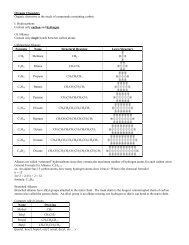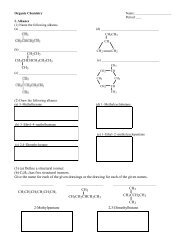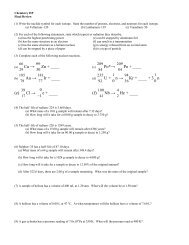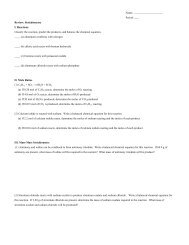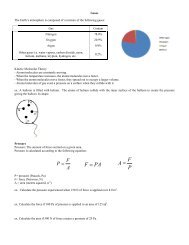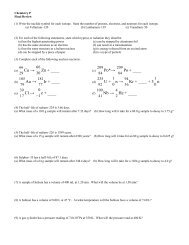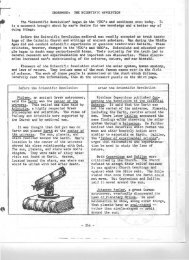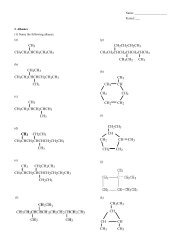- Of course, the whole territories-slavery deal was the big issue of the Presidential Election of 1848, e/tboth sides tried very hard to keep the issue away.- The Democrats ran Senator Lewis Cass of Michigan and General William Butler of Kentucky [Polk saidthat once was enough]. Cass had <strong>com</strong>e up w/the idea of popular sovereignty for the territories, but theparty platform still held that Congress couldn’t interfere w/slavery.- The Whigs nominated General Zachary Taylor, a Southern slaveowner and war hero, and CongressmanMillard Fillmore of NY – and they likewise claimed that Congress couldn’t do anything.- The issue just wouldn’t disappear, though, and a new party even formed b/c of Northern concern overslavery. The Free-Soil Party [“Free Soil, Free Speech, Free Labor, Free Men”], which formed from formerLiberty Party supporters and antislavery Whigs, nominated Van Buren as its candidate and got 10% votes.- The election, which Taylor won [as some Southern Democrats voted for him e/t he was a Whig], showedthat politics was, more than ever, splitting along sectional [instead of party and religious] lines.*The Compromise of 1850*- The first big problem was about California, which had been populated in 1849 as a result of the Gold Rush,and was applying for statehood with a free state constitution [since Congress couldn’t decide what to do,Taylor had told CA to apply for admission directly].- Southerners, however, wouldn’t accept CA as a free state b/c it would upset the delicate balance betweenfree and slave states – so they tried to make CA a slave state or at least extend the Missouri line.- Sensing another <strong>com</strong>promise was necessary, Henry Clay [veteran of the 1820 and 1833 deals] steppedback up and, with the help of Stephen A. Douglas, came up with the Compromise of 1850. Obviously, thebig issue was when territories could prohibit slavery [North = AS<strong>AP</strong>, South = very late in process whenslaves hopefully already there].- At first, the bill didn’t pass [Daniel Webster helped by giving it his support, but Calhoun did the oppositew/his speech] – but after Douglas split it up and had Congress vote on each aspect separately it worked.There were 5 basic aspects to the deal… CA came in as a free state. Texas boundary kept at present limits but Texas given $10 million in <strong>com</strong>pensation for loss ofterritory to New Mexico. New Mexico and Utah territories to be decided by popular sovereignty. Slave trade banned in Washington DC. A new harsher fugitive slave law.- Yeah, it wasn’t so much a decision as it was an evasion [bought time for nation, some say it won war forNorth b/c it gave them more time to finish industrializing].- The two major problems with the <strong>com</strong>promise were as follows: What the heck does “popular sovereignty” mean? Nobody knew for sure – so the Southdecided it would mean wait-until-there-are-slaves-and-then-vote, but the North didn’t agree.The new Fugitive Slave Act: basically it allowed slaveowners to go into court in their states toshow evidence their slaves had escaped, have court officials identify the validity of the claim,and then possibly send US marshals after the person [they were paid extra $ to return theperson, too]. This was not too popular w/the North, and abolitionists saw it as a violation of<strong>Am</strong>erican rights. Violent resistance even broke out in many Northern towns as a result of theslave catchers [Shadrach Minkins taken across to Canada in 1851, Jerry McHenry freed byabolitionist mob, “Christiana Riot” occurred in Lancaster County].- Also on the abolitionist front came Harriet Beecher Stowe’s Uncle Tom’s Cabin (1852), which was a hugebestseller. UTC both indicted slavery by describing the horrors of slave life and criticized Northern racism; itsapproach gave slavery a new human face for many Northerners who had never been to the South.- Then the whole Underground Railroad deal annoyed slaveowners even more – e/t the thing was never asorganized as many thought it was, it was a source of constant irritation for the Southerners as it was also asymbol of resistance to oppression and focused more attention on the injustice of slavery.*The Election of 1852 and the Collapse of Compromise*- The Democrats ran Franklin Pierce of New Hampshire, and he won easily over the Whig nominee,General Winfield Scott. Pierce defended the rights of each area while Scott ignored the issue, so the Southhad reason to believe nat’l support for the Compromise of 1850 might get rid of the problem altogether. TheFree-Soil party also ran a candidate [anti-<strong>com</strong>promise, of course].- But in reality Pierce just won b/c the Whigs were being torn apart by sectional strife [and the deaths ofTaylor, Webster and Clay didn’t help either]. By 1852 the Whigs were pretty much a thing of the past.34
- Anyhow, Pierce’s total support for the <strong>com</strong>promise aggravated much of the North [esp. his enforcement ofthe FSA, for ex. the case of Anthony Burns] and radicalized the situation big-time even among formerconservatives. Juries stopped convicting abolitionists [ex. ones that stormed courthouse in Burns case] andstates passed personal-liberty laws to stop federal enforcement.- As a sidenote, sectional conflict also managed to derail [OK, bad joke] plans for a transcontinental RRDand mess up annexation negotiations w/Hawaii and Cuba.*The Kansas-Nebraska Bill and the Destruction of the Party System*- The next big problem began when Douglas [the C1850 guy] decided to introduce a bill about the Kansasand Nebraska Territories. Douglas felt the slavery thing would be no big deal – all he wanted was somemore $ for his home state of Illinois [transcontinental RRD thing].- Boy did he pick the wrong topic – as soon as he mentioned the thing, the whole differing interpretations ofpopular sovereignty deal exploded. To make matters worse, K&N were on the non-slavery side of theMissouri line, so using PS there would invalidate the whole Missouri Compromise too!- Naturally, Southern Congressmen demanded a repeal of the MC, which Douglas actually gave them,thinking the climate of the area wouldn’t allow for slavery anyway. Then by May 1854 [e/t opposition wasextremely strong from the anti-slavery people] the bill passed, opening a ton of formerly anti-slave land up!- The results of the K&N Acts…again [like C1850] the new laws acted like catalysts for anti-slavery forces[many more states passed personal-liberty laws, resisted the FSA]. Most importantly, though, the K&N Actssplit the dying Whig party once and for all into Northern and Southern wings, lowered support for theDemocratic Party, and led to the creation of a new political party, the Republican Party.*The Politics of Sectionalism: Republicans and Democrats*- Basically, in the summer and fall of 1854, the Republican Party was formed from the antislavery Whigsand Democrats, the Free-Soilers and various other groups. They had a spectacular rise in the North[east]and managed to get most of the Northern House seats on their first appearance on the ballot in 1854.- The only party that was still nat’l by this time was the Democratic Party, except for a short period where the<strong>Am</strong>erican Party [a.k.a. the Know-Nothings] also <strong>com</strong>peted at that level [but they were mostly successful inthe North]. The KN’s were anti-Catholic/anti-immigrant, but only lasted until 1856.- So, besides the obvious, what were the new Republican and Democratic parties all about? Republicans were for the exclusion of slavery from the territories, new protective tariffs andmore federal funding for RRDs/infrastructure, and for a free homestead act that would providefor parcels of land [not large enough for plantations, though]. Their ideology represented thenew, industrial North – the key was the importance of work and opportunity [South isbackwards] and the idea of the liberty to find work on new land. Important to note that someRepublicans were not necessary anti-slavery in itself, many were even racist! Democrats were *no kidding* for the extension of slavery into the territories. E/t mostSouthern Democrats were not slaveowners, the party’s appeal to racism [basic idea = if blacksare not enslaved, this is bad for whites in general] won over many of the yeoman farmers.Another element was the idea that restrictions on slavery were inherently against constitutionalprinciples. Both these ideas helped blur the class lines in the South.- Things only intensified with time…*Bleeding Kansas and the Election of 1856*- In Kansas, both abolitionists and Southerners began sending in forces to support their side and influencethe decision, which was to be made through popular sovereignty. As conflicts became increasingly violent,the nation’s attention focused more and more on Bleeding Kansas.- During elections for the territorial legislature, Border Ruffians [i.e. proslavery Missourians] screwed up thevoting and caused the pro-slavery side to win. This led to the Free-Soilers creating their own gov’t, a proslaveryposse killing some of them in 1856, and the whole John Brown rebellion/revolution scheme. Eventhe Senate was losing it [SC Representative Preston Brooks hit MA Senator Sumner w/cane].- The polarization continued into the Presidential Election of 1856, where Democrat James Buchanan[chosen b/c uninvolved in controversies] beat out the Republican candidate, John C. Frémont.*The Dred Scott Case*- The whole Dred Scott deal started when a Missouri slave named *wow what a surprise* Dred Scott suedhis owner for his freedom b/c his owner took him in a free state. In 1857, the case reached the SC.Normally, the SC liked to stay out of slavery controversies [1851 decision – state courts decide].35
- Page 3 and 4: Congregationalists (Puritans) - The
- Page 5 and 6: - So the Restoration Colonies, form
- Page 7 and 8: - So in England, where they were lo
- Page 9 and 10: *Colonial Politics 1700-1750: Relat
- Page 11 and 12: - Another ideology that was beginni
- Page 13 and 14: - The Quebec Acts were passed aroun
- Page 15 and 16: - So, by 1782, what had seemed to b
- Page 17 and 18: on the economic side, since the gov
- Page 19 and 20: - Anyway, Congress had several ques
- Page 21 and 22: - Adams was still in the early Wash
- Page 23 and 24: *Political Factionalism and Jeffers
- Page 25 and 26: - Samuel Slater set up the first te
- Page 27 and 28: - Court rulings extended the powers
- Page 29 and 30: Revival, Reform and Politics during
- Page 31 and 32: - Anyhow, during his administration
- Page 33: TEXAS (Southerners) - Texas had bee
- Page 37 and 38: They had a smaller everything: smal
- Page 39 and 40: - The two Northern victories at the
- Page 41 and 42: - The result was the Fourteenth Ame
- Page 43 and 44: The Slaughter-House Cases (1873) -
- Page 45 and 46: in the arrest of 8 immigrant radica
- Page 47 and 48: case (1897 - ICC can’t set rates)
- Page 49 and 50: - The Populists prepared to run aga
- Page 51 and 52: - MOST IMPORTANTLY, though, was the
- Page 53 and 54: - So, what led the US to undertake
- Page 55 and 56: - The rebellion, led by Emilio Agui
- Page 57 and 58: - Still, Americans managed to turn
- Page 59 and 60: - So - the point of this episode? B
- Page 62 and 63: *Hoover’s Response*- Poor Herbert
- Page 64 and 65: - In FDR’s second term, however,
- Page 66 and 67: Dominican Republic - When we left i
- Page 68 and 69: World War II (1941 - 1945)*The Cour
- Page 70 and 71: - So Truman started off again all c
- Page 72 and 73: - First of all, the 1950s were (for
- Page 74 and 75: peace w/Japan that ended occupation
- Page 76: - France wanted out, so at the Gene



